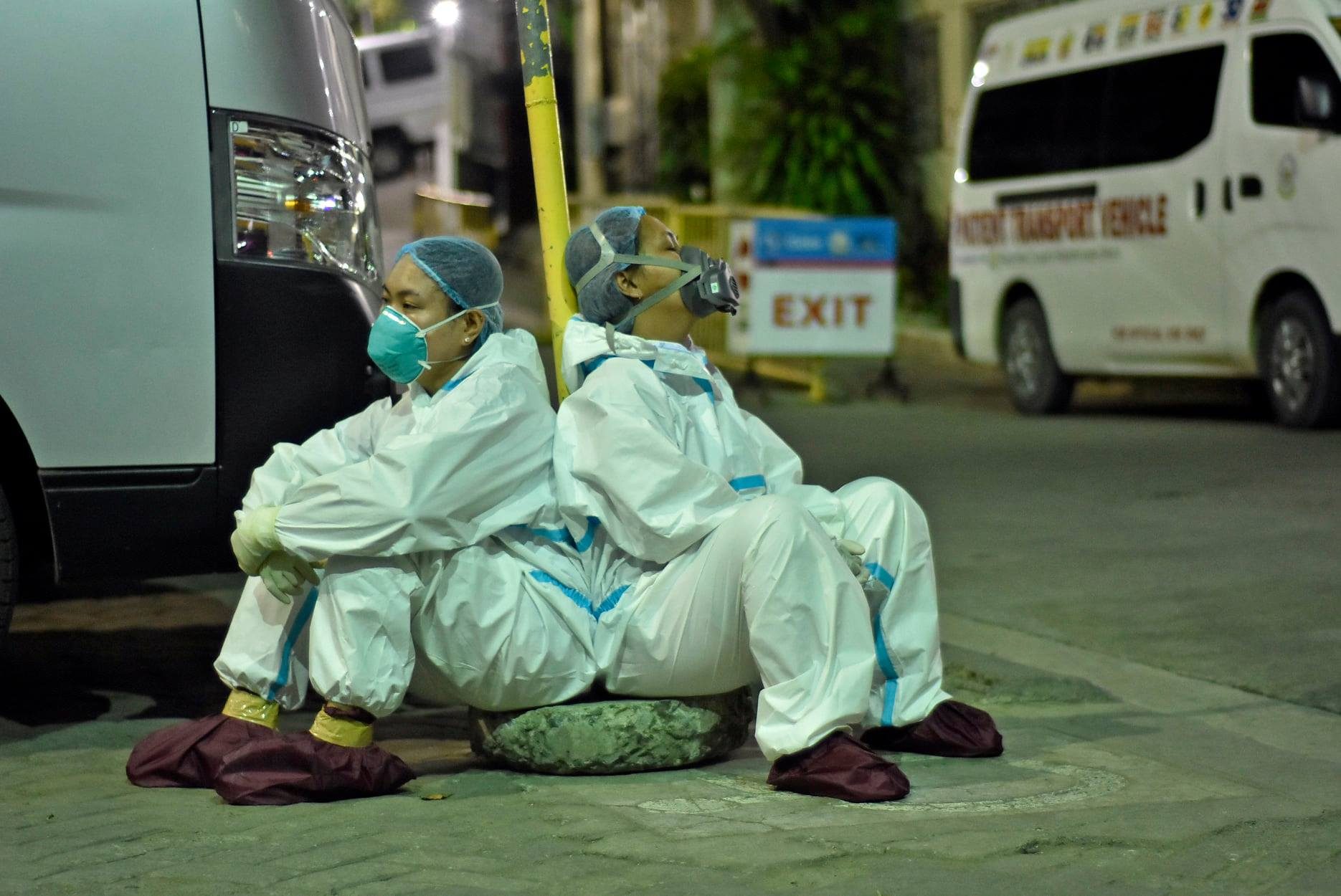Overworked, underpaid health workers are walking away as Delta ravages PH

James*, a 32-year-old nurse resigned in mid-July from the provincial hospital where he had served for more than seven years. It was a tough decision to make, but the choice was between a job and protecting his family from contracting the deadly coronavirus. He wanted a hospital that offered better working conditions.
“Halos dalawang buwan eh wala kami sinasahod, delayed. Kung may pamilya ka, siyempre saan ka kukuha ng pangkain? Doon talaga ako napuno,” an emotional James told Rappler in a phone interview on Thursday, September 2.
(Our salary was delayed for two months. If you have family to support, how will you be able to put food on the table? That was the last straw for me.)
James is the breadwinner of the family. He has a son who is an incoming Grade 4 student, while his wife is pregnant with their second child. He said that the condition of his pregnant wife was also a major consideration in his decision since his exposure to the virus was very high – he had been assigned to the emergency department of the hospital.
“Exposed na exposed talaga ako dahil na-assigned ako sa ER. Nabuntis kasi si misis, sabi ko mahirap ang ganito, kaya nag-resign na ako. ‘Yung exposure doon sa virus, matindi eh,” he said.
(I was really exposed in the hospital because I was assigned in the ER. My wife got pregnant, and so I said this will risky, so I resigned. The exposure to the virus there was really high.)
James said the workers received little to no help from the hospital so they could be better protected. He said they requested the management to provide them lodging so that they wouldn’t bring home the virus to their family. This request seemed to have fallen on deaf ears.
“Nag-suggest kami sa ‘bisor ko sa ER na kung sakali na puwede kami magkaroon ng bahay, kaming mga staff, kasi marami na sa amin ang nagpa-positive. Sabi aaprubahan pa raw. Hanggang sa umalis ako, wala pa rin,” he said.
(We suggested to our supervisor in the ER if they could provide us lodging because many among the staff were getting sick and testing positive for the virus. They said it was still up for approval. Up until I left, the request had not been granted.)
Delayed salary, benefits
As the country deals with the fresh surge in infections driven by the highly transmissible Delta variant, health workers who are on the front lines continue to suffer from poor working conditions and delayed benefits.
Frustrated health workers recently took to the streets to demand the release of their long overdue COVID-19 benefits.
“If we are heroes for you, why has it been a year now yet we are still here in the streets calling and shouting for the immediate release of our hard-earned COVID-19 benefits?” said Edwin Pacheco, president of the National Kidney and Transplant Institute Employees Association- Alliance of Health Workers.
At the House of Representatives’ deliberations on the proposed 2022 budget of the Department of Health on Wednesday, September 1, the DOH said some 526,727 health workers were eligible to receive special risk allowance (SRA). Of these, a total of 399,395 had received theirs.
127,332 health workers
Still waiting for their special risk allowance
The DOH explained that issues in paperwork contributed to the delays in the release of benefits since they needed to validate if a health worker indeed directly treated COVID-19 patients.
Senators have said that all health workers, whether they are directly treating COVID-19 patients or not, should receive special risk allowance since they are all exposed to the risk of contracting the virus.
Based on a joint circular from the DOH and the Department of Budget and Management, eligible health workers may receive a special risk allowance not exceeding P5,000 per month. It would cover the number of days the health workers physically reported to work in a month from September 15, 2020, until June 30, 2021.
It seems health workers cannot expect better benefits next year. During deliberations on the health department’s proposed budget for 2022, it was bared that no funds were allocated for health workers’ allowances.
Exodus
Various hospitals have been hit by resignations, aggravating a shortage of manpower and exposing once more the plight of health workers in the Philippines.
In 2020, about 40% of Filipino nurses in private hospitals resigned, according to the Private Hospitals Association of the Philippines. Recently, St. Luke’s Medical Center, a big private hospital, was hit by resignation of employees, affecting its operations at a time when admissions were rising in an unprecedented levels.
In a press briefing on Friday, September 3, Philippine College of Physician’s president Dr. Maricar Limpin turned emotional as she read the statement of the Healthcare Professionals Alliance for COVID-19 (HPAAC) on the status of health workers.
“Maraming healthcare workers ang pagod, umiiyak, naglalabas ng galit, o nagre-resign na sa trabaho. Nagdurugo ang puso namin, at humihingi kami ng patawad, sa mga pasyenteng kinakailangang tanggihan dahil di na kayang ma-admit,” she said.
(Many of our healthcare workers are tired, shedding tears, angry, or resigning. Our hearts are bleeding, and we are sorry, for patients whom we have to turn away because we cannot admit them anymore.)
The HPAAC is the Philippines’ largest group of health workers, and includes medical groups that called on the government to review its pandemic response. The group had said the country was “losing the battle” against COVID-19.
James was able to find a job in a small private hospital in their province. Though his salary is smaller than what he was getting from his previous job at a government facility, he takes consolation in not experiencing delays in compensation anymore.
Asked if he has plans to leave the country, James said, “If there will be better opportunity, why not?”
For many years, Filipino nurses have been leaving the country after failed attempts at fighting for higher wages and better working conditions.
According to the Department of Labor and Employment (DOLE), an entry-level registered nurse receives an average salary of P8,000 ($160.39) to P13,500 ($270.66) per month.
Registered nurses hired by private hospitals commonly receive an average salary of P9,757 ($195.62) a month. In government facilities, starting salary of nurses is at P33,500 ($671.64).
More than a year into the pandemic, the Philippines is still struggling to contain it with over 2 million of the population infected and more than 33,000 reported fatalities. On August 30, the Philippines saw its highest ever single-day tally of new COVID-19 cases at 22,366.
“Ang daming pangako, tapos hindi naman natutupad. Iyon ‘yung pattern nila: titingnan ito, aaralin ito. We are in a national health emergency situation, ang lahat ng kilos dapat mabilis. Ang bawat oras na sinasayang mo, bawat araw, it means the life of an individual,” said Maristela Abenojar, national president of the Filipino Nurses United.
(There have been many broken promises. That’s their pattern: they will look into this, they will study that. We are in a national health emergency situation, so every action should be swift. Every hour, every day that you waste can cost the life of an individual.) – Rappler.com
*Name has been changed for privacy





Nessun commento:
Posta un commento